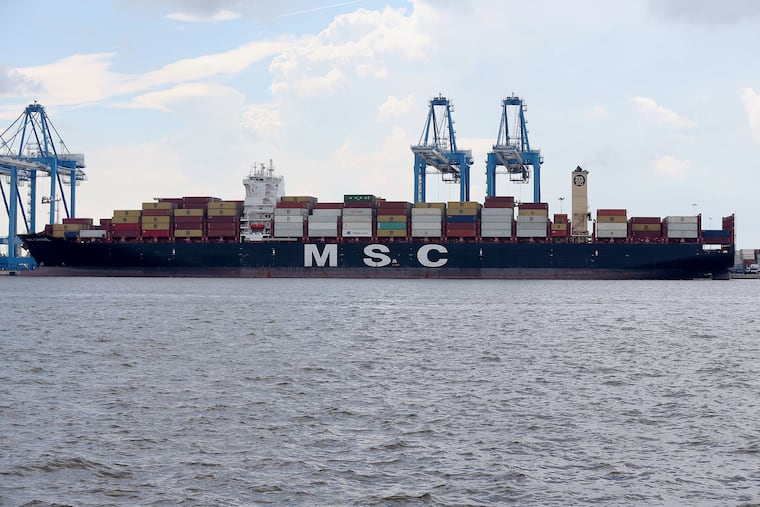The final cargo ship crewman charged in a 20-ton Philly cocaine bust was sentenced to more than 7 years
Aleksandar Kavaja, 28, of Montenegro, told the court he was forced into the trafficking effort by a powerful and murderous drug cartel that dominates his home country.

The final cargo ship crewman charged in connection with a 2019 attempt to smuggle $1 billion worth of cocaine through the Port of Philadelphia was sentenced to more than seven years in prison Tuesday after telling a federal judge he had no choice but to participate or risk death at the hands of a murderous cartel.
Aleksandar Kavaja, a 28-year-old ship’s electrician, said that five days before he set sail on the MSC Gayane, a man cornered him at a café in Montenegro. The stranger did not give his name but told Kavaja he knew who he was and where his family lived.
He handed the electrician a cellphone and instructed him that once at sea, he should use it to coordinate with cocaine suppliers in South America, who would meet the ship on its journey. And then he left just as mysteriously as he had arrived, pausing only to impart a threatening warning: “You’re going to work for us now.”
“What were his choices?” Kavaja’s attorney, Andres Jalon, asked in court Tuesday. “If he doesn’t get on the boat or goes to the authorities, he’s going to get killed. If he refuses to cooperate while they’re at sea, he’s going to get thrown over the side.”
That cloak-and-dagger narrative of menacing cartel figures and intrigue on the high seas mirrored accounts shared by nearly all of the other Gayane crewmen who have sought mercy while facing sentencing before U.S. District Judge Harvey Bartle III.
But it also underscored the fact that while eight members of the ship’s crew are now serving prison terms, the men ultimately responsible for the smuggling effort and who stood to profit most likely remain free and unknown to authorities.
Investigators have closely guarded details of any progress they’ve made in tracing the source of the drugs — from the Packer Avenue Marine Terminal, where U.S. Customs and Border Protection agents discovered the illicit cargo in 2019, to Rotterdam, Netherlands, where the drugs were ultimately bound. From South America, where the cocaine was produced and packed for transport to Montenegro, a tiny Balkan nation whose two most lucrative industries — the staffing of international shipping vessels and cartels moving cocaine through Europe — collided to produce one of the largest drug busts in U.S. history.
» READ MORE: Just how much is 20 tons of cocaine?
For their part, the crewmen have also remained tight-lipped. Most, like Kavaja, said they never knew the identities of the men who recruited them. And all have taken pains to make clear that even if they did, they wouldn’t necessarily share them.
When a Montenegrin newspaper incorrectly reported last year that Kavaja had struck a deal to cooperate with U.S. authorities, his lawyer demanded a retraction. Jalon reiterated his client’s lack of cooperation again Tuesday, telling Bartle that Kavaja feared that if word got out back home that he was talking, his family might be killed.
“In Montenegro, the cartel controls the police,” Jalon said.
And yet, despite the silence of the men sitting in prison, some details of the Gayane’s fateful journey have emerged.
At least four members of the crew had been recruited by the traffickers before the ship even set sail. They recruited three other men while at sea.
Speedboats, hauling 20 tons of cocaine, approached the Gayane under the cover of darkness at several points during its journey between Panama and the Peruvian coast. Kavaja and the others pulled it aboard with cargo nets and then hid it in shipping containers carrying legitimate cargo like wine, vegetable extract, Chilean dried nuts, and scrap metal bound for Europe, Africa, and Asia.
Kavaja’s role, prosecutors said Tuesday, was to use the phone he was given in Montenegro to alert the drug suppliers in South America to the Gayane’s location as it skirted the South American coast. In exchange, said Assistant U.S. Attorney Alexandra M. Lastowski, he was to have been paid the equivalent of $50,000 — the equivalent of a full year’s wages on his electrician’s salary.
“He was a critical member of the operation,” she told the judge. “And he went into it with his eyes wide open. … He was aware of what he was being asked to do, and he chose to do it.”
But unlike many of the other crew members, who, according to Jalon, have admitted to participating in other smuggling efforts on previous journeys, this was Kavaja’s first offense — an anomaly for a young man who saw his job as a ship’s electrician as a ticket to see the world and experience other countries.
“He never wanted to be a cocaine smuggler,” he said. “He wanted to work on the seas.”
Or as his mother, Ranka, put it, watching Tuesday’s proceedings via videolink from Montenegro: “He’s just a child who made a mistake” — one that now ensures he will spend the next several years experiencing America from a prison cell.